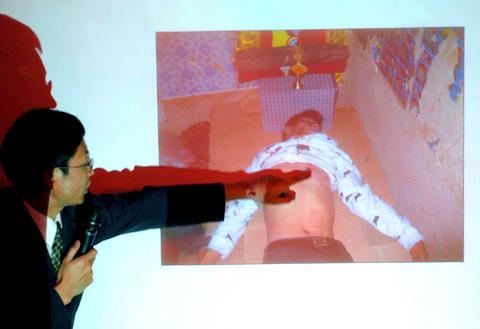Twenty-one exiled Chinese democracy activists condemned Beijing's violent crackdown on protests in Tibet during a press conference in Taipei yesterday.
"We cannot and will not be silent," the activists said in a joint statement. "Our silence will be a message to the brutal Chinese Communist Party [CCP] regime that it could benefit from the Olympics while hurting its own people."
The activists, who came from several countries, including the US and Australia, have come to Taiwan to observe tomorrow's presidential election.

PHOTO: LO PEI-DER, TAIPEI TIMES
They went into exile following their participation in various campaigns or demonstrations for democracy, including the Tiananmen Massacre in 1989.
"A beast does not show its wild side everyday -- but it does at key moments," said Yang Jianli (楊建利), chairman of the Institute for China in Taiwan.
"A lot of people have the wrong idea about the communist regime" because of China's rapid economic development, Yang told the press conference. "People forget that the Chinese communists have always been violent at heart."
Wang Dan (
Hence, all those who are threatened by the regime, "whether you're Tibetan, Taiwanese, a Falung Gong practitioner, a member of the underground churches, or a democracy activist, we should all stand together to make change," Wang said.
Xue Wei (薛偉), president of the Chinese Democratic Solidarity Union, accused the Beijing government of being insincere about peacefully resolving the Tibet issue.
"Chinese Premier Wen Jiabao [溫家寶] said that he will hold talks with the Dalai Lama under two conditions: first, the Dalai Lama give up Tibetan independence, and second, the Dalai Lama must urge the Tibetans to stop acts of violence," Xue said.
"But these two conditions are what the Dalai Lama has been advocating for years," he said.
The activists further urged the Chinese government to allow freedom of the press, release all political prisoners, stop arrests of human rights and democracy activists and ban blacklisting.
In another media conference, Tibetan Representative to Taiwan Tsegyam showed pictures of the dead bodies of demonstrators and video clips of military trucks and tanks moving into Tibet.
The Tibetan government in exile had received the images from various media organizations and private sources, he said.
"These images show that the killing and repression are still going on," Tsegyam said.

Taiwan has received more than US$70 million in royalties as of the end of last year from developing the F-16V jet as countries worldwide purchase or upgrade to this popular model, government and military officials said on Saturday. Taiwan funded the development of the F-16V jet and ended up the sole investor as other countries withdrew from the program. Now the F-16V is increasingly popular and countries must pay Taiwan a percentage in royalties when they purchase new F-16V aircraft or upgrade older F-16 models. The next five years are expected to be the peak for these royalties, with Taiwan potentially earning

STAY IN YOUR LANE: As the US and Israel attack Iran, the ministry has warned China not to overstep by including Taiwanese citizens in its evacuation orders The Ministry of Foreign Affairs (MOFA) yesterday rebuked a statement by China’s embassy in Israel that it would evacuate Taiwanese holders of Chinese travel documents from Israel amid the latter’s escalating conflict with Iran. Tensions have risen across the Middle East in the wake of US and Israeli airstrikes on Iran beginning Saturday. China subsequently issued an evacuation notice for its citizens. In a news release, the Chinese embassy in Israel said holders of “Taiwan compatriot permits (台胞證)” issued to Taiwanese nationals by Chinese authorities for travel to China — could register for evacuation to Egypt. In Taipei, the ministry yesterday said Taiwan

‘LIKE-MINDED PARTNER’: Tako van Popta said it would be inappropriate to delay signing the deal with Taiwan because of China, adding he would promote the issue Canadian senators have stressed Taiwan’s importance for international trade and expressed enthusiasm for ensuring the Taiwan-Canada trade cooperation framework agreement is implemented this year. Representative to Canada Harry Tseng (曾厚仁) in an interview with the Central News Agency (CNA) said he was increasingly uneasy about Ottawa’s delays in signing the agreement, especially as Ottawa has warmed toward Beijing. There are “no negotiations left. Not only [is it] initialed, we have three versions of the text ready: English, French and Mandarin,” Tseng said. “That tells you how close we are to the final signature.” Tseng said that he hoped Canadian Prime Minister Mark Carney

POSITIVE DEVELOPMENT: Japan and the US are expected to hold in-depth discussions on Taiwan-related issues during the meeting next month, Japanese sources said The holding of a Japan-US leaders’ meeting ahead of US President Donald Trump’s visit to China is positive news for Taiwan, former Japan-Taiwan Exchange Association representative Hiroyasu Izumi said yesterday. After the Liberal Democratic Party’s landslide victory in Japan’s House of Representatives election, Japanese Prime Minister Sanae Takaichi is scheduled to visit the US next month, where she is to meet with Trump ahead of the US president’s planned visit to China from March 31 to April 2 for a meeting with Chinese President Xi Jinping (習近平). Japan and the US are expected to hold in-depth discussions on Taiwan-related issues during the